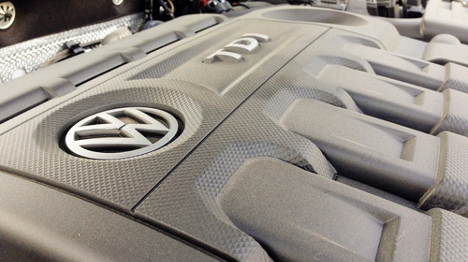General Motors Canada announced this week that it has been awarded a mandate to build a fleet of self-driving 2017 Chevrolet Volts at its Canadian Engineering Centre in Oshawa, Ontario.
This was confirmed by Steve Carlisle, the president and managing director of GM Canada, while speaking to the Economic Club of Canada in Ottawa on Tuesday, specifying that the vehicles will be a part of a test fleet based at the GM Technical Center in Warren, Mich.
"Our Engineering Centre in Oshawa was a logical place to locate this important work and it is the next step in growing the new mandate of the Centre to focus on work related to the Connected Car," Carlisle said. "The Province of Ontario's leadership in allowing autonomous vehicle testing was a helpful support in securing this advanced technology work for our Canadian facility."
This announcement follows GM Canada’s recent address to the Canadian government, urging it to “act quickly” to ensure they have a “purposeful role” in the evolution of the automotive industry.
According to GM Canada, when the fleet of self-driving Volts are first deployed as part of a broader test at the GM Technical Center in Michigan, GM employees will reserve a Volt using a car-sharing application and select a destination. The GM technology will bring the vehicle to its destination and park it, serving as a rapid development laboratory to provide data and lessons to speed up GM’s technical capabilities for these autonomous vehicles.
In the statement from GM, the company said that the Conference Board of Canada has suggested that autonomous cars could save Canadians $65 billion per year by reducing congestion, consuming less fuel and producing fewer collisions and fatalities.
OMVIC announced it has cracked down on a Toronto-area group for curbsiding and doled out fine of over $54,000.
Ontario’s vehicle sales regulator charged 2141212 Ontario Corp., operating as Monterey Auto Repair — as well as individuals Amilcar Luis Monte Rey Nunez, Anibal Salomon Monte Rey Rios, Sergio Ruben Monte Rey Nunez, Bianca Daniela Lopez and Alejandra Penarrieta — after an investigation found vehicles allegedly being sold illegally from Monterey Auto Repair in Toronto, and at least one other from a nearby apartment complex.
The group has been convicted of curbsiding — acting as a dealer without registration — which violates the Motor Vehicle Dealers Act. The group was also convicted of committing unfair practices in breach of the Consumer Protection Act.
And for some of the convicted individuals, this wasn’t their first offense.
“In Ontario, all dealers and salespeople must be registered with OMVIC. The repair facility was not registered, nor were any of the individuals,” explained Carey Smith, OMVIC director of investigations. “In fact, two of the accused, Amilcar Luis Monte Rey Nunez and Anibal Salomon Monte Rey Rios, had previous curbsiding convictions.”
OMVIC reported that each of the individuals involved were convicted of engaging in an unfair business practice, as well, and didn’t provide important vehicle history disclosure to buyers.
“They were selling cars that had been written off, branded as salvage and then rebuilt, without disclosing this to the purchasers,” stated Smith. “In one instance, a consumer was told the vehicle was a 'good clean car.' In reality, it was a previous write-off that had sustained more than $13,000 collision damage. Another consumer, after specifically asking if the car had ever been involved in an accident, was told the car had been repaired due to “a small scratch at the bottom of the door.”
The car in question had actually been branded as salvage after sustaining more than $10,500 in damage.
The total fine amount for the convicted parties was set at $54,500, plus a 25 percent victim fine surcharge. The fines are to be paid within 12 months.
To check out more of OMVIC’s recent cases, see the Auto Remarketing Canada stories below:
Dealers are calling for the Canadian government to focus on creating an environment for dealerships and small businesses to prosper.
The Canadian Automobile Dealers Association — representing 3,300 franchised dealers — launched its election campaign platform on Monday, which focuses on policy recommendations that will create a favorable environment for dealerships to succeed in what is a challenging domestic economic landscape in light of falling oil prices and a suffering currency exchange rate.
"Car dealers have a great story to tell," said Michael Hatch, CADA chief economist. "We are the largest and most geographically broad sector of the Canadian auto industry, which has come through very challenging times in recent years. As the federal parties finalize their own platforms and economic policies ahead of the vote in two weeks, we are here today to present automobile dealers' election campaign platform to help ensure prosperity in highly challenging domestic economic times."
CADA’s federal policy priorities focus, in particular, on four items, as outlined by the organization:
- Further tax reduction for small businesses and consumers
Explaining CADA’s tax deduction plan, the organization is calling for legislators to improve dealers accessibility to the small business deduction by “reducing the current grind that sees capital-intensive small businesses like auto dealers lose access to the small business tax rate.”
It is also calling for the government to remove lien notes from the calculation of taxable capitol in further efforts to seek access to the small business tax rate.
- A continued push for red tape elimination
CADA is asking the government to continue to cut down on what it calls “needless red tape.” Specifically, the organization is calling for paper fuel economy labels for new cars and trucks to remain voluntary and not mandatory, noting these labels are “old fashioned.”
- Maintenance of automobile leasing provisions in the Bank Act
CADA is also voicing its continued support for the maintenance of current restrictions on the Banks in the automotive leasing business. This is particularly important to the new-car industry as leasing levels extremely high before the economic downturn and fell off dramatically after 2008, impacting the new- and used-car business.
- Policies aimed at improving the way in which the Canada Revenue Agency administers tax law in Canada
On this point, CADA is focusing on calling the government to make the needed investments to ensure CRA has the industry-specific knowledge it needs to “administer tax law fairly and evenly for new-car dealers.” They are also calling for increased communications between CRA’s rulings and audit divisions on business tax policies going forward.
Lastly, the organization is asking the government to continue its efforts to lower tax levels for consumers and small businesses, working to ensure these tax reductions are not made void by provincial tax hikes.
"Canada's car dealers bring to the federal parties a comprehensive list of policy recommendations aimed at ensuring a sustainable economic recovery for small businesses of all kinds," continued Hatch. "As all parties finalize their campaign platforms, we urge them to keep economic policy and small business at the forefront of their policy priorities."
The VW emissions scandal — or Dieselgate, as the public has dubbed it — continues to unfold, as the automaker reported a shift in leadership last week and continues to be hounded by regulators across the globe.
For example, on Sept. 22, the Government of Canada opened an investigation into VW’s alleged use of defeat devices to get around emissions regulations, shortly after VW Canada called for a stop-sale of the effected diesel models.
And this week, Environment Canada announced it is expanding its on-going collaborative work with the U.S. Environmental Protection Agency to assess other diesel vehicles for defeat devices, turning its sights on other brands and automakers, as well.
"Vehicles will be subject to a variety of tests including on-road testing using portable emission measurement systems. This collaboration will ensure we move as quickly as possible to test the broadest spectrum of light-duty diesel makes and models for potential defeat devices,” the statement released on Monday stated. “Environment Canada is actively acquiring light duty diesel vehicles to test for defeat devices or other compliance issues.”
Environment Canada also stated it’s important to note these activities are separate from the VW investigation it announced on Sept. 22.
Just a day after Environment Canada announced it is looking into other diesel makes and models, multiple online reports indicated that VW OEM leadership in Germany is making plans to modify up to 11 million units worldwide to correct the aforementioned defeat device software. The plan is projected to cost $6.5 billion.
The entire incident certainly has escalated — to the point that Volkswagen replaced its top executive last week.
Furthermore, VW also confirmed on Tuesday what reportedly was in the works — with activities in the U.S., Mexico and Canada being consolidated as one new North American region and Winfried Vahland, formerly the chairman of the board of directors at Skoda, as the leader of the region.
The OEM indicated this newly formed region with Vahland at the controls as president and CEO will be effective Nov. 1.
Environment Canada’s statement to start looking into other diesel vehicles for the same issue that brought about the VW investigation might be cause for worry for automakers as the scandal is already heavily impacting consumer trust in VW brand.
A recent survey by California-based AutoPacific shows only 1 out of 4 vehicle owners have a positive opinion of VW, compared to 3 out of 4 prior to hearing the recent news.
Its Audi brand is suffering, as well, as 29 percent of those surveyed said they have a favorable opinion of the brand, compared to 69 percent prior to the news break.
And trust is the automaker is waning, as well, since 64 percent of survey respondents said in light of the issue, they no longer trust VW.
"How Volkswagen handles this issue is critical. Trust in an important issue with consumers, and every brand works hard to maintain that trust," says Dan Hall, Vice President at AutoPacific.
Specifically, in Canada, the Volkswagen brand affected diesel models include:
- The VW Jetta — from 2009-2015
- The VW Golf — from 2010-2015
- The VW Beetle — from 2013-2015
- The VW Passat — from 2012-2015
- The VW Golf Wagon/Sportwagon — from 2009-2015
The initial charges from the EPA also included the Audi A3 (model years 2009-2015).
Less than a week after the U.S. Environmental Protection Agency issued a Notice of Violation of the Clean Air Act to Volkswagen, alleging five of the automaker’s diesel-powered vehicles include “defeat device” software that circumvent emissions standards, Environment Canada joined the field.
Environment Canada announced on Tuesday it is opening an investigation into VW’s alleged use of the aforementioned software that has launched the emission-cheating scandal that has made top headlines since late last week.
This news comes on the heels of Volkswagen Canada issuing a stop-sale for impacted diesel-powered vehicles on Monday. And yesterday, the story took another turn: Martin Winterkorn stepped down from the position of chief executive officer at the Volkswagen Auto Group.
Initially, the EPA was only calling for a recall of 500,000 of the automaker’s diesel models, which include some of its most popular cars, such as the Jetta, Golf and Beetle.
But VW released a statement Tuesday morning noting the defeat device software actually is installed in some 11 million vehicles worldwide, explaining though, that for the “majority of these engines the software does not have any effect.”
Environment Canada estimates that approximately 100,000 VW and Audi four-cylinder diesel cars of the impacted model years — 2009 to 2015 — were sold in Canada.
The organization made sure to point out in its statement that while car owners should know what the alleged defeat device cuts down on the effectiveness or the vehicle’s air pollutant control systems, it is not a safety issue. This fact makes this investigation different from recent recall crisis, such as the General Motors ignition switch recalls and the more recent Takata airbag issues.
Environment Canada said in a statement this week, "The Government of Canada has implemented stringent emissions standards to address air pollutants from new cars sold in Canada to help ensure clean air for Canadians in alignment with the U.S. EPA's standards.
"With aligned emission standards, Environment Canada works closely with the U.S. EPA to ensure our common environmental outcomes are achieved. Upon becoming aware of this issue, Environment Canada acted quickly to examine potential implications for Canada and is in communications with its U.S. EPA counterparts and representatives of Volkswagen Group Canada Inc.,” the statement continued.
The organization stated that after careful assessment of the facts surrounding the case, Environment Canada decided to open an investigation, which will involve, gathering, from a variety of sources, evidence and information relevant to a suspected violation.
"Canadian legislation and regulations prohibit vehicle manufacturers and importers from equipping a vehicle with a defeat device. If officers uncover sufficient evidence of violations, enforcement action will be taken in accordance with the Compliance and Enforcement Policy for the Canadian Environmental Protection Act, 1999 (CEPA, 1999),” the statement went on to say.
It concluded by mentioning that since the investigation is ongoing, “it would be inappropriate to provide further information at this time.”
Specifically, in Canada, the Volkswagen brand affected diesel models include:
- The VW Jetta — from 2009-2015
- The VW Golf — from 2010-2015
- The VW Beetle — from 2013-2015
- The VW Passat — from 2012-2015
- The VW Golf Wagon/Sportwagon — from 2009-2015
The initial charges from the EPA also included the Audi A3 (model years 2009-2015).
The Ontario Motor Vehicle Industry Council announced this week it is cracking down on a BMW salesperson for what OMVIC management is calling an elaborate vehicle export scheme.
George Chan — a salesperson employed as a business manager at a BMW dealership in Markham — has been charged by OMVIC for falsifying information and furnishing false information, which violates the Motor Vehicle Dealers Act (MVDA).
OMVIC alleges Chan creates false bills of sale using the names, addresses and contact information of dealership customers, in order to facilitate the purchase of vehicles for export to China.
OMVIC’s release explained the consumers were not financially indebted by the scheme, but their personal information was obtained and used without their knowledge or consent.
“Exporting new cars out of Canada to foreign markets such as China is a lucrative business, as these luxury makes often sell for two or three times their Canadian value,” stated Carey Smith, OMVIC director of investigations. “Unfortunately, these export schemes often involve forging documentation and fraudulently using ‘straw buyers’ or nominees to conceal the sale from the manufacturer and in this case, from the dealership as well.”
According to the dealership, under its agreement with BMW Canada, the store must ensure all new BMWs sold in Canada are not picked up by individuals of companies for the purpose of exporting.
In fact, OMVIC shared penalties imposed by the manufacturer for this offense can be significant.
The dealership in question cooperated fully with OMVIC’s investigation, and the offending salesperson’s employment has been terminated by the store.
Chan, of Maple, Ontario, will face two charges under the MVDA and is scheduled to appear in court in Newmarket on Sept. 25.
The Harper Government announced a plan to align the country’s emission regulations with the U.S. in an effort to cut down on air pollution from vehicles and gasoline.
Environment Minister Leona Aglukkaq made the announcement last week, noting the new standards for on-road vehicles are “part of its (Harper Government) ongoing commitment to improve air quality for Canadians.”
What does this mean for the Canadian auto industry going forward?
Starting with the 2017 model year, Canada’s Tier 3 regulations will introduce more dramatic air pollutant emission standards for new passenger cars, light-duty trucks and certain heavy-duty vehicles, such as delivery vans.
The Harper Government also said the country will also lower limits on the allowable sulphur content of gasoline beginning in 2017, again aligning Canadian standards with the United States.
“Common Canada–United States standards deliver significant health and environmental benefits, while maintaining our economic competitiveness and protecting good, high-paying jobs in integrated sectors, including automotive manufacturing and refining,” the Harper Government’s release stated.
According to the release, the transportation sector makes up nearly a quarter of the country’s greenhouse gas emissions and is also a major source of smog-forming air pollutant emissions for Canada’s largest cities.
The full explanation of Canada’s new Tier 3 regulations can be found here.
Here are a few key facts to keep in mind in regards to the new fuel emission standards and regulations, according to the Harper Government:
- According to the release, once the Tier 3 vehicle standards reach full stringency with the 2025 vehicle model year, the new standards will represent a reduction of up to 80 percent in smog-forming air pollutant emissions for new vehicles compared to the current Tier 2 vehicle standards.
- Amendments to the Sulphur in Gasoline Regulations will reduce the allowable sulphur content of gasoline by nearly 70 percent beginning in 2017. Lower sulphur gasoline will enable the effective operation of advanced emission-control technologies used to comply with the more stringent vehicle air pollutant emission standards and will also lead to reductions in air pollutants from vehicles already on Canadian roads.
- By 2030, it is estimated that the Tier 3 vehicle and fuel standards will result in cumulative health and environmental benefits of $7.5 billion and cumulative fuel and vehicle related costs of $2.7 billion. Accordingly, the projected benefits would exceed the projected costs by a ratio of almost 3-to-1.
- The projected health benefits from the Tier 3 vehicle and fuel standards are significant. Between 2017 and 2030, it is estimated that reductions in air pollutants from vehicles will prevent about 1,400 premature deaths, nearly 200,000 days of asthma symptoms and 2.8 million days of acute respiratory problems in Canada.
"Our Government is continuing to move forward with responsible regulatory measures that reduce air pollution and greenhouse gas emissions from the transportation sector while maintaining Canada's economic competitiveness and protecting good, high-paying jobs in sectors of the economy integrated with the United States,” said Aglukkaq, who is also the Minister of the Canadian Northern Economic Development Agency and Minister for the Arctic Council. “Our Tier 3 regulations will cut air pollution and protect the health and environment of Canadians by establishing the most stringent national standards in the world for air pollutant emissions from new cars and light trucks."
And this is just the most recent step made in an effort to regulate air pollutant emissions from vehicles.
Specifically, total emissions of nitrogen oxides and volatile organic compounds from passenger vehicles and light trucks operated on Canadian roads have decreased by almost 40 percent from 2006 to 2013, due in part to regulatory actions and protection.
Auto Remarketing Canada learned this week that the dealers who lost a class-action suit against General Motors of Canada Ltd. — the results of which were announced earlier this month — will appeal the ruling that GM did not did not breach any common law or statutory obligations toward the dealers related to the wind-down agreements sent in 2009.
When asked to confirm whether an appeal for the dealers was on the table, David Sterns — a partner with the Sotos LLP firm representing the dealers — told Auto Remarketing Canada, “Yes, we will absolutely be appealing.”
And the almost 200 former GM Canada dealers participating in the class action aren’t the only ones unhappy with the rulings Justice Thomas McEwen announced in early July.
Law firm Cassels Brock, which has close ties to all parties involved, is appealing the penalty doled out by Justice McEwan in the form of a payout of $45 million for damages to the dealers involved in the closings related to a breach of contractual and fiduciary duties.
Canadian Lawyer reported after the penalty was announced that Cassels Brock general counsel John Birch said it’s business as usual, and the firm is actively pursuing an appeal. Birch was quoted by Canadian Lawyer as saying the judgment “creates potentially indeterminate liability for lawyers.”
Appeals were expected by many in the industry in regards to this case, and now a final ending to the class-action saga launched in 2011 may still be a ways off.
Auto Remarketing Canada reported earlier this month that the ruling had been made in the class-action lawsuit filed against General Motors of Canada in regards to actions taken to close dealerships amid the economic downturn, and the claims against GMCL were dismissed.
Justice McEwen came down hard on the law firm Cassels Brock, but said in the 160-page report covering the case that GMCL did not breach any common law or statutory obligations toward the dealers and did not breach the Arthur Wishart Act (franchise disclosure) back in 2009.
The dealers’ appeal may address that very issue, though the court may still need some convincing. Did GMCL, in fact, breach their duty of fair dealing by giving dealers only six days to accept or decline wind-down agreements?
The appeals courts will most likely once again address this issue, as Cassels Brock also looks to dispute a penalty company management thinks the firm did not deserve.
A final ruling has been made in the class-action lawsuit filed against General Motors of Canada in regards to actions taken to close dealerships amid the economic downturn. With that, the claims against GMCL have been dismissed.
That said, Justice Thomas McEwen has come down hard on the law firm Cassels Brock, which has close ties to all parties involved, for breach of contractual and fiduciary duties, calling for a payout of $45 million for damages to the dealers involved in the closings.
Back in 2009, when General Motors Co. was in the throes of the recession and a federal auto bailout from the U.S., the company's Canadian arm was forced to close over 200 GMCL dealerships to satisfy the demands of the Canadian government.
A class-action lawsuit was then filed in 2011. It aimed to secure $750 million in damages for the dealers who lost their businesses, with the potential to alter the industry concept of franchise protection and dealer rights.
The case finally came to a head after a 41-day trial that took place in December, as Justice McEwen said in the 160-page report covering the case released last week that GMCL did not breach any common law or statutory obligations toward the dealers.
And the claim from plaintiff Trillium Motor World Ltd. — representing 181 dealers who accepted the non-renewal and wind-down agreements (WDA) from the automaker — was dismissed as McEwen ruled that GMCL did not breach the Arthur Wishart Act (franchise disclosure) back in 2009.
At the time, the dealers were given six days to accept or decline the offers. Out of the 240 dealers, 202 of them accepted the offers, executing and returning the WDAs to the automaker.
The ruling announced GMCL’s counterclaim against Trillium and each of the class members was also dismissed by McEwen.
Interestingly, it was a different story for one party: the law firm Cassels Brock, which was retained by the Class Members, including Trillium, to protect their interests in any complex restructuring of the dealer network and to represent them in any GMCL CCAA (Companies’ Creditors Arrangement Act) proceedings.
Justice McEwen found that Cassels breaches its contractual and fiduciary duties by accepting the retainer by Class Members and Trillium, even though the firm had already agreed to act for the Federal Government in regards to any GMCL CCAA proceedings.
McEwen said, “Cassels knew about this conflict from the outset; yet, rather than declining to act for GMCL dealers and referring the dealers to an unconflicted law firm, or even telling the dealers about the retained with the Federal Government, Cassels continues to act for both the Federal Government and the dealers.”
Furthermore, McEwen said the firm also breached its contractual duties by working for both the GMCL dealers that has signed WDAs, as well as those who were continuing with GMCL, citing, “it knew or ought to have known that the two groups of dealers had divergent and adverse interests.”
McEwen also asserted Cassels maintained a “’Wait-and-See Approach,’ long past its appropriateness,” which resulted in lost negotiation opportunities for Class Members for increased wind-down payments from GMCL.
The justice allowed Tillium’s claim against Cassel and ruled the firm award the Class Members aggregate damages of $45 million for the lost opportunity.
The trial, held in December, took 41 days to complete, and the parties involved called 25 witnesses to the stand, including eight experts.
To view the full report — Trillium Motor World Ltd. v. General Motors of Canada Limited — see here.
The Ontario Motor Vehicle Industry Council announced this week it has revoked a Toronto dealer’s license and fined an associated salesperson.
The dealership, 1716114 Ontario Ltd. operating as Your Car Auto Finance (YCAF) and its sole officer and director, Derek Booth, have had their licenses revoked.
The ruling came after OMVIC issued a Proposal to Revoke Registration and the dealer abandoned its appeal, the regulatory organization reported.
And in a related discipline proceeding, Scott Edwards, a former salesperson at YCAF, was found in breach of OMVIC's Code of Ethics and fined $12,500.
In its Proposal, OMVIC alleged YCAF and Booth “failed, in a timely manner, to remove liens from vehicles traded-in.”
As a result, consumers were making unnecessary payments or receiving unwarranted enquiries/demands from financial institutions.
In one specific example, OMVIC alleged the dealership sold a vehicle and did not discharge an existing lien.
The report stated OMVIC also alleged the dealer provided bills of sale with odometer readings that were often lower than the readings shown on other documents in the dealer's possession and on other historical odometer records.
The regulator also alleged financial terms and sale prices for the vehicles provided on some customers' bills of sale differed from those in the dealer's records.
"Our inspection and subsequent follow-up uncovered a business model we believe was heavily weighted towards soliciting business from financially disadvantaged consumers who were deceived regarding vehicle history and financing issues. Many of these consumers were from First Nations reserves in remote Ontario, Quebec, Manitoba, New Brunswick and Nova Scotia communities," explained Laura Halbert, OMVIC director of compliance. "In speaking to some of these consumers it was clear they never saw their vehicles in advance of delivery and most didn't immediately scrutinize the documentation."
Edwards was fined as he was involved in many of the transactions OMVIC investigated.
In an Agreed Statement of Facts before OMVIC's Discipline Committee, Edwards admitted breaching OMVIC's Code of Ethics, and acknowledged his failure to meet legal duties, including his professional obligation to prevent errors, misrepresentations, fraud and unethical practices, OMVIC reported.
Edwards was also ordered to complete the OMVIC Certification Course. He is currently employed at an unrelated GTA dealership.
OMVIC is currently aware of one consumer victim who purchased a vehicle with an undischarged lien from Booth.
"We have successfully worked with the finance company on the consumer's behalf to resolve that problem," explained Halbert.
The issue of liens can be problematic for dealers and consumers. CarProof reported just last year that 37 percent of all vehicles on the road in Canada have a current lien.
Liens present an interesting issue for both dealers and consumers as they represent the right of a lender to keep possession of the vehicle belonging to another person until a debt owed by that person is paid in full.












